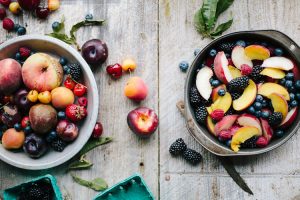 According to Ayurveda, one of the main ways to nourish our Prana (lifeforce) is through the food we eat. This means that in order to maintain this vital energy, one must eat the proper foods, in the proper manner to nourish our body and mind to their fullest potential. Prana governs all movement in the body and therefore creating healthy Prana creates optimal energy levels, circulation, respiration, sense perception and mental functioning.
According to Ayurveda, one of the main ways to nourish our Prana (lifeforce) is through the food we eat. This means that in order to maintain this vital energy, one must eat the proper foods, in the proper manner to nourish our body and mind to their fullest potential. Prana governs all movement in the body and therefore creating healthy Prana creates optimal energy levels, circulation, respiration, sense perception and mental functioning.
Although many individuals maintain a healthy diet, they may not be absorbing the potential nutrients properly. In fact some may be eating relatively healthy yet still dealing with weight issues, low energy, indigestion, malabsorption and reduced immunity. This is because they are either not digesting the food properly, not consuming the food properly, or they are consuming food void of its original nutrients.
This lifeless food is then considered “dead” food. You are what you eat, so if you are continuously consuming this dead food, your nutrient levels will be diminished, and your vital life-force (aka Prana) will be depleted. In fact, consuming even healthy foods, in the improper manner can create raw undigested food in the system, leading to poor digestion and toxic accumulation, both of which can lead to depleted Prana and future disease.
How to Get the Most Prana Out of Your Food
1. Avoid leftover food.
Leftover food is considered dead food as it rarely carries the original healthy properties of its fresh counterpart. This is for several reasons. The first is that leftover food becomes old and oxidized, reducing its nutrient value. Refrigeration creates a cold, rough, dry and stale quality to the original food which in turn depletes the nutrient value and increases Vata dosha in the system. Reheating the food depletes the original nutrients further.
With all of this in mind, even the healthiest of meals becomes depleted of its prana-enhancing (life-promoting) nutrients, and becomes harder to digest (which leads to improper absorption of nutrients as well as toxins in the system).
If leftovers are truly needed due to a busy schedule, then it is always best to eat them within the first day after making the food, period. The longer the food sits, the less the nutrient value and the more likely it will create ama or toxins in the system. These toxins further diminish the digestive fire leading to a nasty cycle of toxins, poor digestion and malabsorption.
2. Do not eat burnt food.
When cooking, it is vital to avoid the consumption of burnt food. This one may be obvious, but sometimes it can be tempting if you have spent a while cooking a meal only to sadly find out of its ruin in black chards.
Burnt food is not only completely devoid of any nutrient value, the crispy black result is considered carcinogenic meaning it creates oxidation of our cells, which accelerates the aging process and can lead to to serious diseases such as cancer. Needless to say, burnt food is equally harmful for our digestion as the molecular structure of the food has been altered making it much harder to digest. Undigested food is the main cause of toxins in the system and the lead cause of all disease.
3. Stay away from frozen, canned and processed food.
These food types are once again considered to be dead food, devoid of its original health properties. They all carry an old and stale property, and often contain preservatives, additives, high sodium levels and other hidden, unhealthy ingredients. Frozen food often carries an additional cold and rough quality and canned foods have potential to leach harmful chemicals from their metallic homes (which they have likely been sitting in for a lengthy time). Processed food undergoes changes from their original whole food state, reducing the nutrient content and becoming overall harder to digest.
Instead of these more convenient food types, one should solely eat fresh, home-cooked meals and snacks using strictly whole food ingredients. It may take some getting used to, but like any habit it becomes easier and more second nature with practice and patience. In fact overtime, you will likely create an aversion to these other foods once you are used to the delicious, incomparable flavor of vibrant, prana-increasing fresh whole foods and home-cooked meals.
Click here for some healthy whole food recipes!
4. Cook with attention and love.
If you are cooking your food, it is extremely important to cook with the proper attention and intentions. If you are arguing or just had a stressful day, it is important to pause, clear your mind and calm the energy before making your meal. Instead when cooking, one should cook with great focus, gratitude and love. Smell the aroma of the meal cooking and appreciate the delicious foods you are so fortunate to cook and consume. This attention and gratitude will surely enhance the life-giving pranic qualities of any meal!
5. Eat with attention and love.
It is not always what we are eating, but how we are consuming our food. With our increasingly busy schedules, it is easy to fall prey to eating on the go, in the car, while working or while talking on the phone. When one eats while distracted by these other activities, we are automatically reducing our digestive fires, leading to poor absorption of nutrients and undigested food (ama) in the system. This common practice often leads to overeating, grazing, mindless eating or taking in unhealthy foods.
Instead it is essential for healthy eating and healthy digestion to give our full attention and gratitude to our meals when we snack or eat. This allows us the opportunity to appreciate our food, taste each taste, chew each bite and realize when fullness sets in. This healthy habit leads to better digestion and allows us to absorb the prana-enhancing nutrients of our meals more readily.
6. Keep the digestion strong.
Even the healthiest of foods give little benefit if one cannot digest them properly. Undigested food (whether healthy or not) becomes toxic to the system all the same.
Symptoms of an imbalanced digestive fire (agni) include:
- Sleepiness after food intake
- Sluggish metabolism
- Indigestion symptoms (gas, bloating, heartburn, hyperacidity, etc)
- A heavy coating on the tongue (indicating toxins in the system)
- Teeth marks around the perimeter of the tongue (indicating malabsorption)
- General feelings of heaviness and lethargy
- Dull, foggy mind
- Lack of appetite OR excessive hunger
- Constipation OR diarrhea
Digestive enhancing remedies:
- Sip on ginger tea or CCF tea between meals (get our CCF Tea recipe here!)
- Take a digestive “appetizer” before each meal (try our ginger, lime and honey appetizer here)
- Avoid overeating
- Avoid incompatible food combinations (get our full chart on incompatible foods here)
- Avoid fluid intake before, during and after meals
- Take a digestive aid before meals
A few other dietary tips for increasing Prana include:
- Eat organic foods whenever possible
- Eat locally grown foods whenever possible
- Eat only seasonal fruits and veggies
- Always avoid stale, old or moldy food



What is wrong with pre cooked rice or grain eaten the following day or quinoa?
Hi there! Thanks for your question! Eating freshly cooked foods is by far the best method for getting the full nutrient value from our foods. Once a food has been sitting for a prolonged period of time (whether on a shelf or in your refrigerator) then the nutrient value begins to decrease due to the old, stale, dry, rough and cold qualities that the food begins to take on. These qualities will also increase Vata in the system and can lead to various Vata disorders overtime (i.e. gas, bloating, irregular digestion, constipation, dryness, sleep issues, anxiety, etc). As I mention however, if you are to eat leftovers, it is essential to always consume them the following day, as they begin to loose their Prana more and more overtime. I hope this helps to answer your question. Thanks for reading!
Namaste,
Danielle
How can we improve the digestive fire ?
Hi Laxman,
There are many ways to improve the digestion using Ayurveda. If you look at the #6 recommendation above, there is a handful of remedies to begin with. This is a great place to begin! You can also read about my top 10 Ayurvedic “food rules” for healthy digestion in this article here.
I hope this helps! Digestion is our key to health and happiness, so making even a few of these changes will be quite beneficial!
Namaste,
Danielle
I thought fluid helps you digest food. I can’t imagine ever having a meal without water. Why has it to be avoided before during and after ? Thanks 🙏
Hi Pete,
This is an excellent question and I am glad you asked!
It is extremely important to have proper hydration before meals to allow the stomach to produce digestive acids. A properly hydrated stomach lining also acts as a buffer to avoid issues like ulcers and gastritis. Since thirst can often be disguised as false hunger, staying hydrated may even prevent overeating. So hydrating before a meal is indeed necessary!
With all of this being said, however, it is best to sip on water steadily between meals and drink about 4 to 8 ounces of water 30 minutes (give or take) before eating. If you drink too much water directly before, during, or directly after eating, this will water down the digestive acids and enzymes and hinder proper digestion. Of course, if you need a few small sips to get you through your meal, this is much different than chugging a large cup of water (or any beverage). Ideally, the water should be warm to hot as well, and never cold or iced.
I hope this helps clarify things. Please let me know if you have any further questions!
Namaste,
Danielle